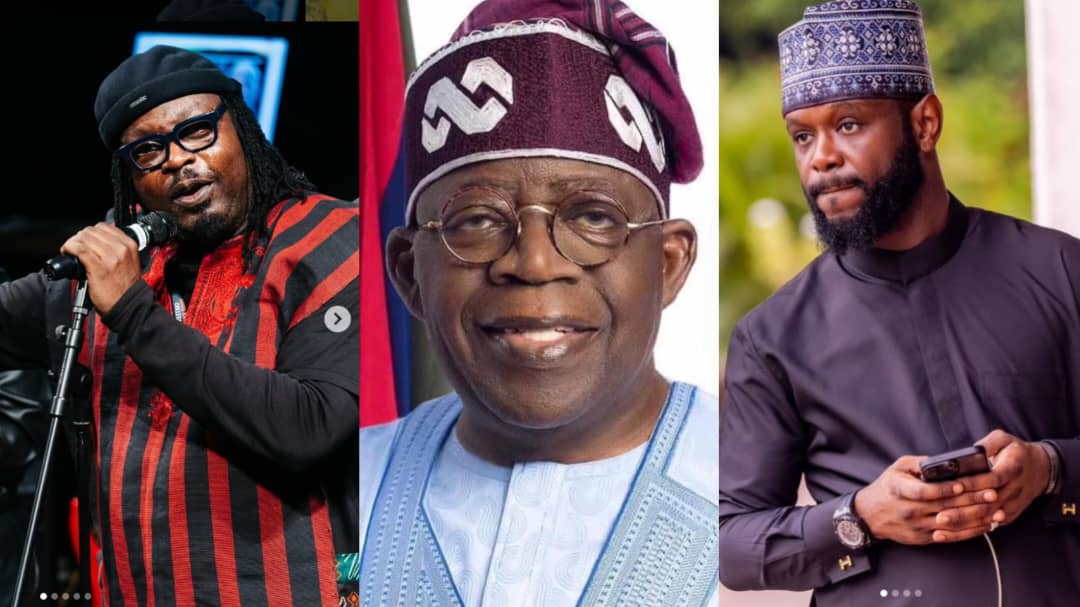Veteran rapper and outspoken social critic, Eedris Abdulkareem, has addressed mounting controversy over his latest single, “Tell Your Papa,” denying claims that the track was a personal attack on Seyi Tinubu, son of President Bola Ahmed Tinubu.
Appearing on Rubbin’ Minds, a Channels Television programme on Sunday, Abdulkareem said the song was inspired not by personal animosity but by Seyi Tinubu’s public remarks at a March 2025 event in Yola, Adamawa State, where the President’s son declared his father to be “Nigeria’s best-ever president.”
“If Seyi Tinubu never said what he said, I wouldn’t have recorded a song like that,” Abdulkareem stated during the interview. “I was inspired by his statement. It’s not personal. I just wanted to ask him to tell his father the truth about how ordinary Nigerians are suffering.”
The song, which has quickly gone viral on social media but was banned from public airwaves by the National Broadcasting Commission (NBC) shortly after its release, directly addresses the widening gap between Nigeria’s ruling elite and the average citizen.
In its lyrics, Abdulkareem calls on Seyi Tinubu to relay the pain and frustrations of millions of struggling Nigerians to his father in Aso Rock.
The NBC’s decision to ban the track has ignited fierce public backlash, with many seeing it as a blatant act of censorship and an alarming return to the suppression of artistic freedom. Among those criticizing the ban is Nobel Laureate, Professor Wole Soyinka, who described it as a “troubling erosion of free expression.”
The rapper, who rose to prominence in the early 2000s with his hard-hitting protest anthem “Nigeria Jaga Jaga,” said his message remains consistent: using music as a tool for truth-telling and social advocacy.
“Sadly, that song is still relevant today because not much has changed,” he noted, reflecting on how the same economic and governance challenges he decried 24 years ago still plague the country.
READ ALSO: Eedris Abdulkareem shares ‘GoFundMe’ account for medical bills
Abdulkareem dismissed claims that “Tell Your Papa” was politically motivated or an orchestrated attack on the President’s family. Instead, he positioned the song as a reflection of public sentiment and frustration over worsening living conditions.
In a pointed message to Seyi Tinubu, Abdulkareem advised caution when making public statements about governance, especially in the midst of economic hardship and widespread insecurity.
“It looks more perfect when you’re silent than when you speak,” he said. “Next time, he should hand the microphone to the MC. He lacks the charisma and purpose to speak truthfully about Nigeria’s economic reality.”
While acknowledging that President Tinubu may be a caring father, Abdulkareem argued that this private devotion does not translate to broader national impact, especially for the youth.
“He has empowered Seyi, but Nigerian youths are hungry, jobless, and unsafe,” he said. “I challenge Seyi to travel by road without security. Let him experience what ordinary citizens go through every day.”
The controversy surrounding “Tell Your Papa” underscores the ongoing tension between artistic activism and political power in Nigeria.
As Abdulkareem continues to use his platform to amplify the voices of disenfranchised Nigerians, the government’s response—particularly the NBC’s ban—has reignited conversations about freedom of speech and the role of artists in political discourse.
For many observers, Abdulkareem’s defiant stance is a reminder of music’s enduring power to challenge authority and hold the powerful accountable—no matter how uncomfortable the message may be.

 Entertainment6 days ago
Entertainment6 days ago
 Health1 week ago
Health1 week ago
 Health4 days ago
Health4 days ago
 Football1 week ago
Football1 week ago
 Football1 week ago
Football1 week ago
 Crime5 days ago
Crime5 days ago
 Education6 days ago
Education6 days ago
 Crime1 week ago
Crime1 week ago

